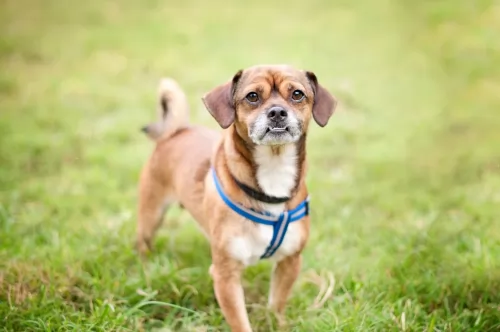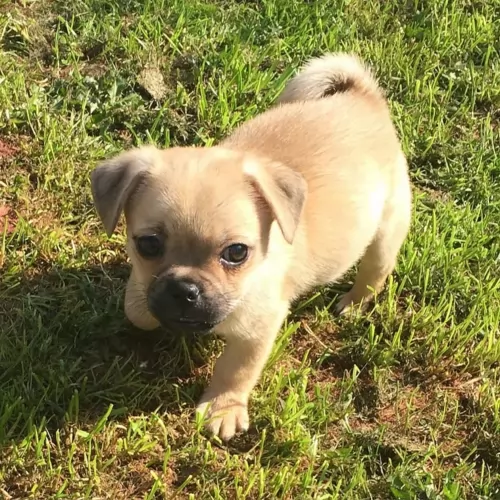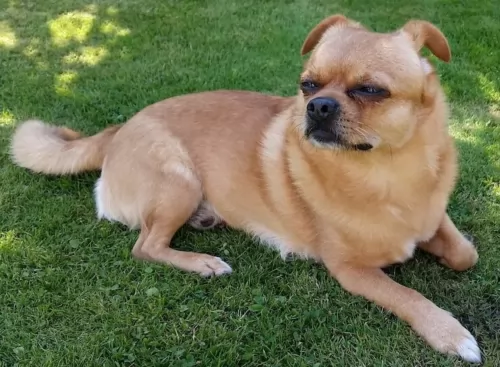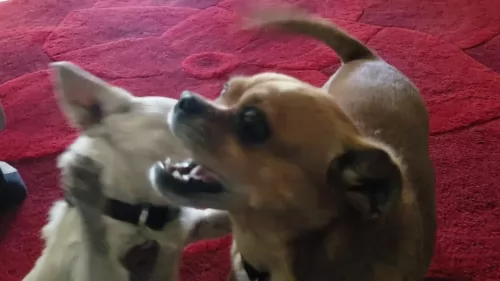 Petzlover
Petzlover Chug is originated from United States but Portuguese Water Dog is originated from Portugal. Chug may grow 32 cm / 12 inches shorter than Portuguese Water Dog. Chug may weigh 18 kg / 39 pounds lesser than Portuguese Water Dog. Both Chug and Portuguese Water Dog has almost same life span. Both Chug and Portuguese Water Dog has same litter size. Chug requires Moderate Maintenance. But Portuguese Water Dog requires Low Maintenance
Chug is originated from United States but Portuguese Water Dog is originated from Portugal. Chug may grow 32 cm / 12 inches shorter than Portuguese Water Dog. Chug may weigh 18 kg / 39 pounds lesser than Portuguese Water Dog. Both Chug and Portuguese Water Dog has almost same life span. Both Chug and Portuguese Water Dog has same litter size. Chug requires Moderate Maintenance. But Portuguese Water Dog requires Low Maintenance
 The Chug is a crossbreed with the Pug and the Chihuahua. It is a hybrid not a purebred. Over the past ten to fifteen years people have been developing the Chug, mostly in the United States. People were looking for a lapdog with the characteristics of both the Chihuahua and the Pug. The hybrid dog has characteristics of both breeds, both physical and behavioral. Of course, the Chug is not recognized by the AKC, but it is recognized by hybrid and designer dog clubs such as The American Canine Hybrid Club, Designer Breed Kennel and the International Designer Canine Registry.
The Chug is a crossbreed with the Pug and the Chihuahua. It is a hybrid not a purebred. Over the past ten to fifteen years people have been developing the Chug, mostly in the United States. People were looking for a lapdog with the characteristics of both the Chihuahua and the Pug. The hybrid dog has characteristics of both breeds, both physical and behavioral. Of course, the Chug is not recognized by the AKC, but it is recognized by hybrid and designer dog clubs such as The American Canine Hybrid Club, Designer Breed Kennel and the International Designer Canine Registry.
 The Portuguese Water Dog is a working dog hailing from the Portuguese region of the Algarve. The dog has always been a friend of the sea, working around fishing boats, loving his life around water.
The Portuguese Water Dog is a working dog hailing from the Portuguese region of the Algarve. The dog has always been a friend of the sea, working around fishing boats, loving his life around water.
He descends from dogs that have always been used by Portuguese fishermen, and its believed he has Poodle in him. Known also as the Cao de Agua, which means Dog of the Water, the Portie as he is also known, almost disappeared.
Their numbers dropped in the early 20th century, but a certain Vasco Bensuade saved the breed, forming a breed club, writing a breed standard.
They then also made their way to England and the United States. It was in 1972 that the Portuguese Water Dog Club of America formed. In 1983, the AKC recognized the dog as a distinct breed.
 The Chug can vary greatly in looks and build from one dog to another. For the most part however, Chugs are small compact dogs, sturdy and muscular. They have a very expressive and lovable face with folding ears, almond shape eyes and short muzzles. Their faces are similar in looks to that of a miniature boxer. .
The Chug can vary greatly in looks and build from one dog to another. For the most part however, Chugs are small compact dogs, sturdy and muscular. They have a very expressive and lovable face with folding ears, almond shape eyes and short muzzles. Their faces are similar in looks to that of a miniature boxer. .
 Standing at between 43 and 57cm in height and weighing in the region of 16 to 27kg, the Portuguese Water Dog is a medium-sized, curly-coated dog.
Standing at between 43 and 57cm in height and weighing in the region of 16 to 27kg, the Portuguese Water Dog is a medium-sized, curly-coated dog.
It is believed that the dog is hypoallergenic. He does however shed, though not a lot. He just loves the water and is always ready to plunge in. One of the distinctive characteristics of this dog is its webbed feet.
The Portuguese Water Dog is an intelligent dog that will do well with training and socialization.
It won’t be troublesome training this dog as he is intelligent. They're also calm dogs. Referred to fondly as the Portie, this is a fun-loving dog, friendly and social, getting on well with all members of his human family.
These dogs get on well with children and other family pets. They can be reserved toward strangers, but this makes them good watchdogs.
 Because they are a hybrid, chugs can have a very wide range of different characteristics depending upon whether they have more from the Pug or more from the Chihuahua. But either way they are very lovable little dogs with big personalities. Regardless of whether your dog favors the clown Pug or the stately Chihuahua, your puppy will be a lovable ball of fur. He will be affectionate, friendly and aggressive to bigger dogs.
Because they are a hybrid, chugs can have a very wide range of different characteristics depending upon whether they have more from the Pug or more from the Chihuahua. But either way they are very lovable little dogs with big personalities. Regardless of whether your dog favors the clown Pug or the stately Chihuahua, your puppy will be a lovable ball of fur. He will be affectionate, friendly and aggressive to bigger dogs.
 With training, your Portie can make a splendid pet. He is also adaptable to different living situations, and is capable of living in the city or in the countryside, just so long as his exercise needs are met.
With training, your Portie can make a splendid pet. He is also adaptable to different living situations, and is capable of living in the city or in the countryside, just so long as his exercise needs are met.
He is such an affectionate and loyal, fun-loving dog while also being hard working, and all these wonderful characteristics mean that he can be a treasured pet and companion.
 Portuguese Water Dogs are generally healthy, but like most other dogs they are more prone to certain heath conditions, though your pet is unlikely to get any of them. Still it pays to know of some of the more complicated- and disabling ones.
Portuguese Water Dogs are generally healthy, but like most other dogs they are more prone to certain heath conditions, though your pet is unlikely to get any of them. Still it pays to know of some of the more complicated- and disabling ones.
This is where the thighbone doesn't fit properly into the hip joint. Hip dysplasia spells pain for your dog and he may show lameness with one or both rear legs. Arthritis can develop too.
Hip dysplasia is hereditary, but it can be worsened by allowing your dog to become obese and from injuries from leaping off your bed for instance.
This is a degenerative eye disorder that can lead to blindness, but fortunately it is detectable long before the dog shows signs of blindness.
Reputable breeders have the eyes of their dog certified each year by a veterinary ophthalmologist and they don’t allow the dogs to produce puppies.
 Pugs have great appetites and love to eat and Chihuahuas wont turn down a meal so be careful not to overfeed your Chug. It is important to feed a small breed formula whether you use dry or wet food.
Pugs have great appetites and love to eat and Chihuahuas wont turn down a meal so be careful not to overfeed your Chug. It is important to feed a small breed formula whether you use dry or wet food.
Some additional issues that Chugs deal with in respect to health include:
Both elbow and knee inflammations can lead to arthritis and lameness
Chugs can have runny eyes or cherry eye. If they have cherry eye you will want to treat it immediately or there could be secondary issues with inflammation and infection.
Chugs may be little, but they still need a moderate amount of exercise every day. A regular walk will do or indoor or outdoor playtime every day. They like obedience, rally and some can do small dog agility, but they would have to be on the larger size for Chugs. Chugs also make great therapy dogs.
 Your Portie is a dog that loves outdoor life and lots of exercise. Take him with you on your walks and give him a run off his leash. When he gets home, if you have a pool h’ll be the first to plunge right in. He makes a great pet to have at the sea too.
Your Portie is a dog that loves outdoor life and lots of exercise. Take him with you on your walks and give him a run off his leash. When he gets home, if you have a pool h’ll be the first to plunge right in. He makes a great pet to have at the sea too.
Provide him with plenty of nice chewy toys, balls and ropes so he doesn’t get bored.
Provide him with a nice, dry, warm sleeping area and don’t allow him to be disturbed when he retreats there.
Keep his vaccines up to date to prevent some life threatening illnesses.
Provide him with high quality food that has lots of vitamins and minerals instead of fillers, preservatives, colorants and toxins.
There are some excellent commercially manufactured dog foods which can be convenient and good for your pet. Try and provide him with some tasty homemade food occasionally. Nothing spicy and exotic. Dogs thrive on simplicity and consistency.
Boiled chicken, brown rice or pasta, carrots, spinach and sweet potatoes chopped up and added twice week to the dry kibble is all your dog requires to keep him energetic happy, thankful, healthy and happy.
A little bit of raw meat added in from time to time will be superb. See that he always has access to clean, cool water.